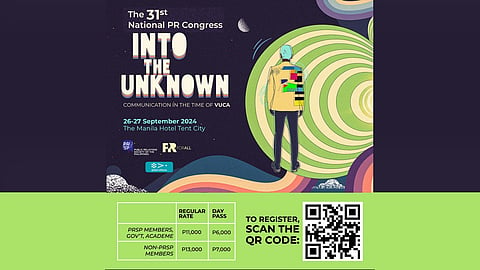
- NEWS
- the EDIT
- COMMENTARY
- BUSINESS
- LIFE
- SHOW
- ACTION
- GLOBAL GOALS
- SNAPS
- DYARYO TIRADA
- MORE

Players in the public relations industry are currently engrossed in digitization, but still, a lot needs to be done to be on par with their Asian counterparts.
Jay Bautista, managing director of Kantar Media, who served as one of the speakers for the 31st National Public Relations Congress at the Manila Hotel on Thursday, disclosed that PR practitioner’s embrace of digitization is seen across all social media and digital platforms, especially TikTok.
“The industry now is fully equipped and has all the necessary skills to be effective in engaging their stakeholders. Indeed, the PR industry is now well-positioned to be effective in this landscape,” Bautista said.
Basics plus AI
Meanwhile, Public Relations Society of the Philippines (PRSP) Vice President and Chairperson of Creatives Norman Agatep maintained that despite the presence of generative artificial intelligence, it would be more effective if practitioners incorporated PR handling with the basics of PR strategies along with AI.
He said PR strategies of today and decades ago differ as things move very fast right now, and PR firms remain slow to adapt due to fear, or are not fully enthralled with AI.
“While before it was very easy to control the message, to dictate the discourse, nobody predicted the pandemic and the acceleration of AI. So, it is (really) a matter of equipping a PR practitioner with the right mindset, skills, and tools to be able to proceed with their jobs regardless of the changes,” he said.
Agatep noted that the time will come when PR practitioners will find ways to take advantage of these changes, following the lead of other countries that have already made significant strides.
“This means understanding what the basics are and applying them to whatever is happening, and to the new technologies to progress. That’s what PR people should understand right now. It’s alright that change happens, but what is more important is the ability to cling to the basics, such as doing PR relationships, and building trusts, among others,” according to Agatep, whose family has been in PR for many decades.
He added that the pandemic indeed occurred and brought a silver lining to the PR world, especially the work-from-home setup that has now been adopted by most PR firms.
“WFH is part of the balance of life, as people are beginning to appreciate their lives by themselves, being able to dictate their work hours and appreciate what happened during the pandemic to better their lives. People who live very far from Manila do not need to commute to the cities and meet clients because of the presence of Zoom and other meeting platforms and still have the same type of conversation with the same positive results,” he explained.
When asked about his forecasts for the industry ten years from now, Agatep said what is inevitable is change and another form of technology aside from AI will surely emerge, which can again alter the current landscape.
“Technology will change—I do not know what will come after AI. What I know is that PR will still be about establishing mutually beneficial relationships. It would still be about doing good and making sure that they do good for the improvement of society. And if we are working with brands, the technology will still be there to connect meaningfully. But our tools will be different ten years from now,” he stated.
The PRSP kicked off the two-day congress on Thursday, with the DAILY TRIBUNE as one of the media partners. The PRSP emphasized that the world has changed dramatically in recent years.
“We now live in a connected society where change is constant, fast-paced, and unpredictable. Rapid advances in technology and events like the pandemic and armed conflict have increased the sense of turbulence, danger, and unpredictability. A state of flux has replaced our sense of certainty, stability and familiarity. Keeping pace with the ever-evolving trends in managing stakeholders vis-a-vis the reputation of organizations has made the operating environment for PR practitioners Volatile, Uncertain, Complex, and Ambiguous, or VUCA,” the PRSP said.
As communicators, the PRSP maintained that their role to help organizations navigate the VUCA world and create change for a better future is more critical than ever.
“PR pros need to be flexible, adaptable, and agile to move with the situation and alter plans as events unfold. That's because the reality is that even the most connected communicators among us can no longer expect to set the agenda or drive messaging. Our role is about anticipating, exploiting, or mitigating any given agenda. We must equip ourselves with tools and best practices to gain the courage and confidence to face the many tough conversations that arise in a VUCA world,” the PRSP concluded.
